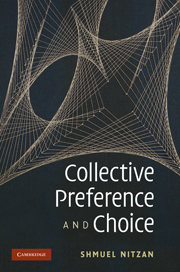Book contents
- Frontmatter
- Contents
- List of figures
- Preface
- Acknowledgments
- Part I Introduction
- Part II Different Preferences
- 4 Do social preferences exist? Arrow's and Sen's impossibility theorems
- 5 The desirable decision rule: axiomatization
- 6 Rule selection based on compromise with the unanimity criterion
- 7 Paradoxes of voting
- 8 Majority tyranny
- 9 The problem of inefficient provision of public goods
- 10 Do individuals reveal their true preferences?
- Part III Identical Preferences, Different Decisional Skills
- Bibliography
- Author index
- Subject index
9 - The problem of inefficient provision of public goods
Published online by Cambridge University Press: 05 June 2012
- Frontmatter
- Contents
- List of figures
- Preface
- Acknowledgments
- Part I Introduction
- Part II Different Preferences
- 4 Do social preferences exist? Arrow's and Sen's impossibility theorems
- 5 The desirable decision rule: axiomatization
- 6 Rule selection based on compromise with the unanimity criterion
- 7 Paradoxes of voting
- 8 Majority tyranny
- 9 The problem of inefficient provision of public goods
- 10 Do individuals reveal their true preferences?
- Part III Identical Preferences, Different Decisional Skills
- Bibliography
- Author index
- Subject index
Summary
In earlier chapters, the social choice was conceived as mechanical: the social decision rule transforms individual choices into a social choice, assuming that individuals are naïve; their behavior conforms to their (true) preference relations, but is not based on strategic considerations. In such a case, the rule aggregating preferences does not necessarily satisfy the Pareto principle. That is, the social preference relation violates the unanimity property (see Theorem 4.1 and Theorem 4.2) or, alternately, the social decision rule does not satisfy the Pareto criterion, as demonstrated in Example 7.4 with respect to the sequential majority rule. In this chapter, we no longer ignore strategic considerations, that is, the possibility that individuals are aware of the relationship between their behavior and the social choice, and take into account the expected actions (voting, decisions) of the other individuals. The discussion will focus on the problem of inefficiency in the economic context of public-good provision. This problem is usually dealt with in public-economics discussions that attempt to justify government intervention on the basis of the market failure argument. We first clarify the fundamental reason for the inefficiency of the social decision rule and, in particular, the inefficiency of the simple majority rule, in the absence of strategic considerations. Allowing strategic behavior, we will then show that it is possible that all individuals choose their optimal strategy and yet the social choice is inefficient. In such a case, we say that a “social dilemma” exists.
- Type
- Chapter
- Information
- Collective Preference and Choice , pp. 146 - 175Publisher: Cambridge University PressPrint publication year: 2009



